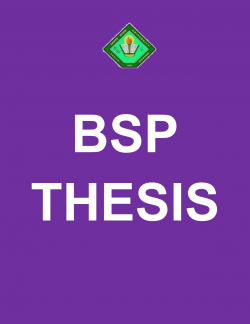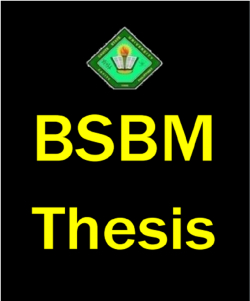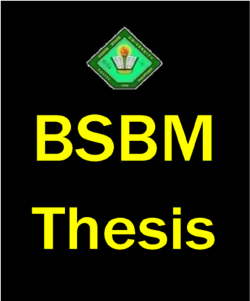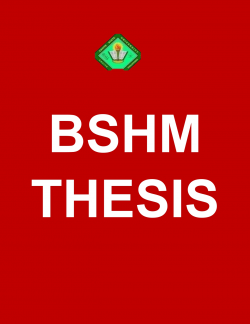Examining the Relationship Between Employee Service Quality and Customer Satisfaction in Quick-Service Restaurant, SM Molino: an Analysis Based on Disconfirmation Theory
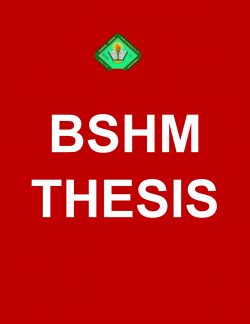
Type
Thesis
Category
Thesis-BSHM
[ Browse Items ]
Publication Year
2025
Pages
xv, 73p.
Subject
Customer satisfaction—Philippines—Cavite. Food service management—Quality control—Philippines. Fast food restaurants—Customer relations—Philippines. Employee training—Hospitality industry—Philippines. Service quality (Management)—Philippines.
Abstract
MOLINO, VESTA CORAZON B., MURILLO, MA. RIZZA C., PAQUERA, MARK JASON V. Examining the Relationship between Employee Service Quality and Customer Satisfaction at Quick Service Restaurant, Sm Molino: An Analysis Based on Disconfirmation Theory. Undergraduate Thesis. Bachelor of Science in Hospitality Management. Cavite State University – Bacoor City Campus, City of Bacoor, Cavite. September 2024. Adviser: Mr. John Darren H. Lubaton.
The researchers surveyed in December 2024 at SM Molino in Bacoor City, Cavite. This study aimed to examine the relationship between employee service quality and customer satisfaction in quick service restaurants at SM Molino in terms of five dimensions of service quality: tangibles, reliability, responsiveness, assurance, and empathy. The nature of the study was quantitative and employed a descriptive method that involved gathering the correlational method. They employed survey questionnaires and utilized other sources such as articles, related literature, and journals. The total number of participants in the study was 100 customers who dined in quick service restaurants such as Jollibee, Burger King, KFC, Chowking, and Pizza Hut. These restaurants were selected because they have experienced the customer service in these quick service restaurants. Furthermore, the researchers employed the purposive sampling technique to understand the depth of the study's explanation. To yield better data results, the statistical treatment consisted of percentage and weighted mean, Likert scale, and Pearson.
The results revealed that among the five dimensions of service quality, the tangibles impact customer satisfaction massively which means that it matters to the customer for a quick service restaurant to have a clean and organized environment, employees are well-groomed and presentable, the food should be tasty and flavourful and the equipment and facilities in the restaurant are modern and functional. Additionally, the quality of service provided by employees in QSRs significantly influences customer satisfaction. Tangibles, such as food quality and the cleanliness of the restaurant, were rated the highest by customers. All five dimensions: tangibles, reliability, responsiveness, assurance, and empathy were found significantly related to customer satisfaction, meaning that improvements in these areas are likely to increase customer loyalty and positive experiences.
The researchers recommend quick service restaurants (QSRs) focus on employee training. QSRs should continue to emphasize high food quality, cleanliness, and the appearance of the restaurant to maintain the relationship with customer loyalty
and satisfaction, improve reliability and speed, and target younger customers because of the high representation of younger age groups. QSRs could benefit from targeted
marketing strategies and menu innovations that appeal to this demographic.
The researchers surveyed in December 2024 at SM Molino in Bacoor City, Cavite. This study aimed to examine the relationship between employee service quality and customer satisfaction in quick service restaurants at SM Molino in terms of five dimensions of service quality: tangibles, reliability, responsiveness, assurance, and empathy. The nature of the study was quantitative and employed a descriptive method that involved gathering the correlational method. They employed survey questionnaires and utilized other sources such as articles, related literature, and journals. The total number of participants in the study was 100 customers who dined in quick service restaurants such as Jollibee, Burger King, KFC, Chowking, and Pizza Hut. These restaurants were selected because they have experienced the customer service in these quick service restaurants. Furthermore, the researchers employed the purposive sampling technique to understand the depth of the study's explanation. To yield better data results, the statistical treatment consisted of percentage and weighted mean, Likert scale, and Pearson.
The results revealed that among the five dimensions of service quality, the tangibles impact customer satisfaction massively which means that it matters to the customer for a quick service restaurant to have a clean and organized environment, employees are well-groomed and presentable, the food should be tasty and flavourful and the equipment and facilities in the restaurant are modern and functional. Additionally, the quality of service provided by employees in QSRs significantly influences customer satisfaction. Tangibles, such as food quality and the cleanliness of the restaurant, were rated the highest by customers. All five dimensions: tangibles, reliability, responsiveness, assurance, and empathy were found significantly related to customer satisfaction, meaning that improvements in these areas are likely to increase customer loyalty and positive experiences.
The researchers recommend quick service restaurants (QSRs) focus on employee training. QSRs should continue to emphasize high food quality, cleanliness, and the appearance of the restaurant to maintain the relationship with customer loyalty
and satisfaction, improve reliability and speed, and target younger customers because of the high representation of younger age groups. QSRs could benefit from targeted
marketing strategies and menu innovations that appeal to this demographic.
Description
This undergraduate thesis investigated the relationship between employee service quality and customer satisfaction in selected quick service restaurants (QSRs) located at SM Molino, Bacoor City, Cavite. Grounded in Disconfirmation Theory, the study examined five service quality dimensions—tangibles, reliability, responsiveness, assurance, and empathy—and their impact on customer satisfaction. Using a quantitative descriptive–correlational research design, the researchers surveyed 100 customers who had dined in QSRs such as Jollibee, Burger King, KFC, Chowking, and Pizza Hut. Statistical tools including percentage, weighted mean, Likert scale, and Pearson correlation were applied for analysis. Results showed that all five dimensions had a significant relationship with customer satisfaction, with tangibles—including cleanliness, food quality, and employee appearance—having the strongest impact. The findings underscore the importance of maintaining a clean and organized environment, prompt service, and professional employee behavior in enhancing customer loyalty. The study recommends continuous employee training, improvements in reliability and service speed, and the implementation of targeted marketing strategies aimed at younger demographics to sustain customer satisfaction and loyalty in the QSR industry.
Biblio Notes
Molino, V. C. B., Murillo, M. R. C., & Paquera, M. J. V. (2024). Examining the relationship between employee service quality and customer satisfaction at quick service restaurant, SM Molino: An analysis based on Disconfirmation Theory (Undergraduate thesis). Bachelor of Science in Hospitality Management, Cavite State University – Bacoor City Campus, City of Bacoor, Cavite. Adviser: Mr. John Darren H. Lubaton.
Number of Copies
1
| Library | Accession No | Call No | Copy No | Edition | Location | Availability |
|---|---|---|---|---|---|---|
| CvSU Bacoor City Campus | 6000215 | 1 | Yes |
